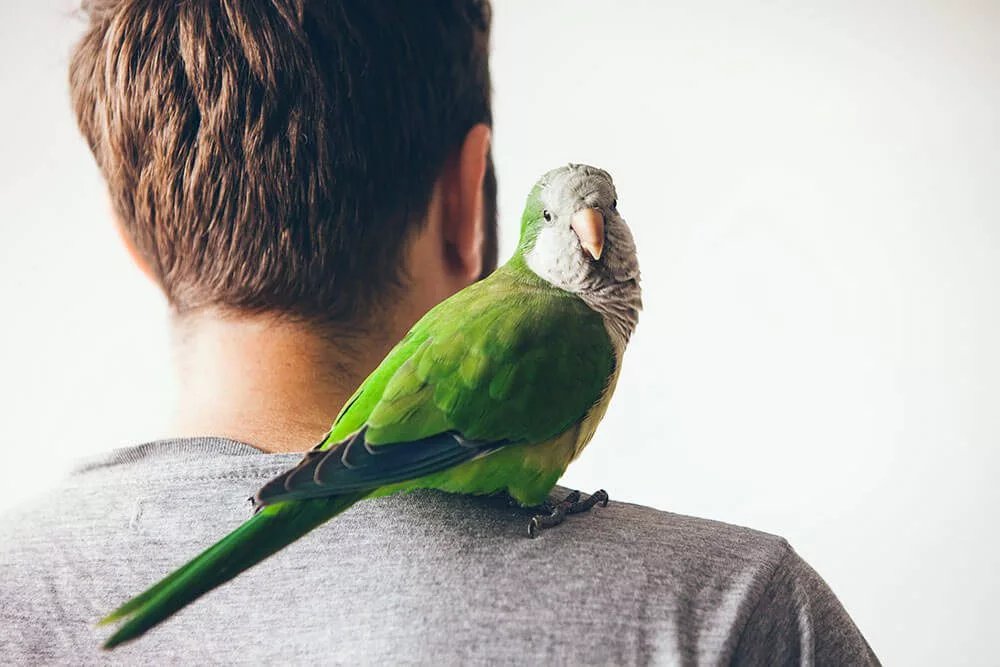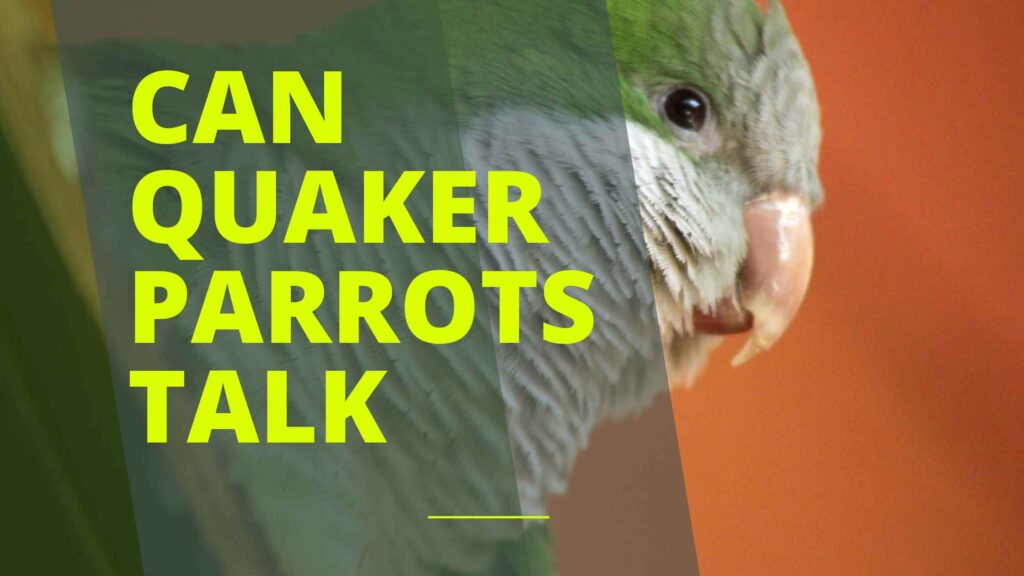Yes, Quaker parrots can talk. They are known for their ability to mimic human speech.
Quaker parrots, also called Monk Parakeets, possess impressive vocal abilities that can rival larger parrot species. With proper training, these small to medium-sized parrots can learn a substantial vocabulary. Their social nature and desire to bond with their owners make them excellent companions for those looking to own a talking bird.
Can Quaker Parrots Talk? Quaker parrots not only mimic words but can also pick up on phrases and tones of voice, which means they can often use their learned words contextually. Owners delight in their Quaker parrots‘ chatty behavior, which makes them popular pets for bird enthusiasts and families alike. When choosing a Quaker parrot as a pet, be prepared for a lively and engaging member of the family, known for their entertaining antics and affectionate demeanor.
The Mimicry Marvel Of Quaker Parrots
Quaker parrots stand out in the bird world. These feathered friends can mimic human speech. They capture our hearts and ears with their vocal skills. It’s like having a little friend who talks back. This talent makes Quaker parrots popular pets.
What Makes These Birds Special
Quaker parrots have a unique talent. They can learn words and phrases. Their brains are wired to copy sounds. This makes them excellent mimics. Quaker parrots do not just copy sounds, they understand contexts. They can greet you in the morning or ask for food when hungry.
People love these parrots for their bubbly personalities. They are social and smart. These traits help Quakers in picking up language. They enjoy interaction with humans. This bond helps them learn from us.
Examples Of Quaker Parrot Speech
Quaker parrots can develop an impressive vocabulary. Here are some examples:
- Simple greetings: “Hello,” “Hi,” and “Goodbye.”
- Names and calls: They can learn names and use them to get your attention.
- Common phrases: “I love you,” “What’s up?” and “Come here!”
- Responses: They can answer simple questions like “Are you hungry?”
Every Quaker parrot is different. Some may speak clearly, while others have a more limited vocabulary. It all depends on their environment and training.
Exploring The Quaker Parrot’s Vocal Abilities
Quaker parrots, also known as monk parakeets, are social and intelligent birds renowned for their ability to mimic human speech. Their vocal talents can be astonishing, making them popular amongst bird enthusiasts. The secret behind their chattiness lies in their exceptional learning skills and their vocalization development as they grow.
How They Learn To Talk
Quaker parrots pick up language through interaction with their human families. Like sponges, they absorb sounds and phrases they frequently hear. Teaching a Quaker parrot to talk involves repetition, patience, and reward.
- Repeated Exposure: Consistent repetition of words encourages Quakers to mimic.
- Engagement: Direct communication with the parrot strengthens learning.
- Positive Reinforcement: Treats and praises after successful mimicry enhances learning.
Age And Speech Development
Quaker parrots begin exploring their vocal range early on. The period between four months to a year old is crucial for speech development, similar to the way human babies learn to talk.
| Age | Vocal Milestones |
|---|---|
| 4-6 Months | Beginning of babbling sounds |
| 6-8 Months | Imitation of simple words and tones |
| 8-12 Months | Formation of more complex words and phrases |
Younger birds assimilate speech easier, yet older Quakers can also learn to talk with consistent training. Bonding with the bird and incorporating daily speech exercises play a pivotal role in their ongoing vocal development.
Verbal Repertoire: What Quaker Parrots Can Say
Quaker parrots, also known as monk parakeets, are renowned for their ability to mimic human speech. Their vocal talents can be surprising and delightful. It’s not just the odd word here or there; these birds can develop a robust collection of phrases and words that they use actively in their day-to-day bird chatter. Let’s dive into their impressive verbal skills.
Common Phrases And Words
Quaker parrots love to talk. Their affinity for mimicking speech makes them sociable companions. They often pick up on phrases they frequently hear around the house. Here are some commonly reported expressions:
- “Hello” and “goodbye” are often among the first greetings they learn.
- Many quakers can say their own name or the names of their family members.
- Simple commands and questions like “step up” or “want some?” are popular picks.
- Phrases associated with routine, like “time to eat”, can become regular parts of their vocabulary.
The Extent Of Their Vocabulary
The extent of a Quaker parrot’s vocabulary can vary widely. Some Quaker parrots can learn dozens or even hundreds of words. Factors including the bird’s environment, the interaction with humans, and individual personality play significant roles in this difference.
| Vocabulary Size | Factors Influencing Growth |
|---|---|
| 20-100 words | Basic interaction, daily speaking |
| Over 100 words | Intensive training, strong bond with owner |
A Quaker’s vocabulary isn’t just about the number of words. It’s their ability to use them in context that astounds. A Quaker might say “want water” when they see you with a drink, or “time for bed” at dusk. Such contextual use of language highlights not just vocal skill but cognitive ability as well.
:strip_icc()/monk-parakeet-in-barcelona-1283029076-245274da359546a6a9a726bdb23a2064.jpg)
Credit: www.thesprucepets.com
Factors Influencing A Quaker Parrot’s Ability To Talk
Welcome to the enchanting world of Quaker parrots, one of the most vibrant and expressive bird species. Quaker parrots, also known as Monk Parakeets, have captivated bird enthusiasts with their ability to mimic human speech. However, not all Quaker parrots talk with the same aptitude. Several factors influence their linguistic prowess. Understanding these can enhance a Quaker parrot’s ability to communicate verbally. Let’s dive into what it takes to unlock their full vocal potential.
Social Interaction
Quality social interaction is a cornerstone in helping a Quaker parrot learn to talk. These birds are highly social creatures that thrive on engagement with their human counterparts or bird partners. Here’s what can make a difference:
- Daily conversation plays a vital role. It exposes them to varied vocabulary.
- Positive reinforcement after attempts to speak encourages repetition.
- Interaction with other talking birds can stimulate learning.
Investing time to communicate with your bird fosters a bond that’s beneficial for their vocal development.
Environmental Conditions
The environment in which a Quaker parrot lives significantly impacts its ability to talk. Optimal environmental conditions are essential. Here is a summarized table of what these conditions include:
| Condition | How it Helps |
|---|---|
| Noise Level | A quieter environment aids concentration on words and phrases. |
| Comfort | A comfortable habitat reduces stress, fostering better learning. |
| Stimulation | Mental and physical toys can increase cognitive engagement and curiosity. |
Remember, a safe and dynamic environment encourages parrots to explore sounds including human speech.
Teaching Your Quaker Parrot To Speak
Quaker parrots are talented talkers. With the right approach, you can teach your feathered friend to mimic words and phrases. This section dives into how to train your Quaker Parrot to speak confidently.
Effective Training Techniques
Effective Training Techniques
Training your Quaker Parrot begins with some key techniques. Simplify the process with these actionable steps:
- Start young: Younger birds learn faster.
- Choose simple words: “Hello” or “Bye” are great starters.
- Use repetition: Repeat words frequently during the day.
- Associate words with actions: Say “eat” when feeding.
- Be lively: Use an excited tone to engage your bird.
- Reward vocalization: Offer treats when your bird tries speaking.
Stick to these methods and watch your parrot’s vocabulary grow!
Patience and Consistency in Training
Patience And Consistency In Training
Teaching your parrot to talk isn’t an overnight process. It takes endurance and regular practice.
- Stay patient: Don’t rush or show frustration.
- Keep sessions short: 10-15 minutes to avoid fatigue.
- Train daily: Consistency is key in reinforcing learning.
- Watch for cues: End training if your parrot seems stressed.
Patience and regularity will lead to success in training your Quaker Parrot to speak.
The Psychology Behind Quaker Parrot Speech
Exploring the psychology behind Quaker parrot speech reveals fascinating insights. These charming birds, known for their talking abilities, captivate owners and researchers alike. But what goes on in their feathery heads when they talk? Are they simply mimicking, or is there more to their vocal feats?
Communication Vs. Mimicry
Understanding how Quaker parrots communicate is key. They don’t just copy sounds—they use them to interact with their environment. Two main reasons explain why they learn human words:
- To bond with their human family members.
- To express needs or emotions.
These parrots exhibit complex behaviors, implying that they understand the context behind the words they replicate. This distinction elevates their speech from mere mimicry to actual communication.
The Emotional Connect
Quaker parrots form strong bonds with their caretakers. This emotional connection influences their ability to talk. They often repeat words associated with positive experiences or emotions. The more a phrase gets reinforced with affection or rewards, the more likely they are to use it. Quakers use speech to:
- Seek attention or food.
- Show affection or contentment.
- Participate in social interactions.
This social aspect of their speech indicates a deep emotional understanding that goes beyond simple imitation.
Case Studies: Talking Quaker Parrots
Quaker Parrots are among the most vocal birds in the parrot family. They can mimic human speech. Quaker Parrots develop a varied vocabulary. This section dives into real-life stories of Quaker Parrots who have amazed their owners with their ability to talk.
Anecdotes From Owners
Many Quaker Parrot owners share fascinating stories. Each bird has a unique personality. Some learn words quickly, while others prefer sounds or music. Here are a few noteworthy cases:
- Charlie: He greets his family every day with a cheerful “Good morning!”
- Lola: She asks for her favorite snack by saying “Want a nut!”
- Pepper: This clever bird switches lights on and off while saying “Lights on!” or “Lights off!”
Record Holders
Some Quaker Parrots stand out. They hold records for their impressive vocabularies. Let’s meet some record holders:
| Name | Words Known | Special Skills |
|---|---|---|
| Max | Over 100 words | Uses phrases in context |
| Buddy | 80+ words | Imitates other pets |
| Skittles | 150+ words | Knows complete songs |
Each record holder shows that Quaker Parrots are exceptional at mimicking human speech. Their capacity to learn and remember is quite remarkable.

Credit: m.youtube.com
Quaker Parrots In The Wild Vs. Captivity
Curious minds often wonder about Quaker Parrots in the Wild vs. Captivity. These charming birds show fascinating differences based on their environment. Let’s explore how their behavior and language change from the wild to your living room.
Differences In Behavioral Expressions
- Wild Quaker Parrots are busybodies. They build large nests and live in colonies.
- In captivity, they show attachment to human companions and mimic household activities.
- Challenges like finding food are common in the wild. This makes wild parrots resourceful and skilled foragers.
- Captive Quakers tend to have more predictable and calmer lifestyles.
Impact On Linguistic Abilities
In the wild, Quaker Parrots communicate with their flock using a series of calls and chirps. This helps them warn of danger, find a mate, or chat about food.
Once in our homes, these feathered friends often learn to imitate human speech. Interaction with people boosts their vocabulary. Their curiosity drives them to repeat words and phrases they hear often.
| Environment | Linguistic Ability |
|---|---|
| Wild | Basic calls for communication |
| Captivity | Improved human speech imitation |
Addressing Myths About Quaker Parrot Speech
Curiosity about Quaker parrots often includes the question, “Can these birds really talk?” The answer is a resounding yes, but let’s clear the air about Quaker parrot speech capabilities. This colorful bird, also known as the Monk Parakeet, has sparked numerous tales about its verbal skills. As we explore these myths, we’ll discover what to truly expect from a Quaker parrot’s ability to mimic human speech.
Debunking Common Misconceptions
Myth 1: “Quaker parrots can learn hundreds of words.” Reality check—while they are gifted mimics, each bird varies in talent. Not all Quakers will become vocab wizards.
Myth 2: “They understand what they’re saying.” Quakers mimic sounds; understanding words is another story. They often learn words associated with daily routines, yet they don’t grasp language the way humans do.
Myth 3: “Quaker parrots can talk as clearly as a human.” Clarify expectations—Quakers have their own vocal style that may sometimes sound garbled compared to human speech. Expect unique enunciations.
Realistic Expectations For Potential Owners
- Patience is key: Teaching a Quaker parrot to talk takes time and persistence. They learn through repetition.
- Reward their efforts: Rewards and positive reinforcement help in motivating speech. Treats can be effective.
- Not a guarantee: Some Quakers may never talk—enjoy their company nonetheless. Their charisma extends beyond words.
Talking abilities can be a thrilling aspect of owning a Quaker parrot but it’s important for potential owners to set realistic expectations. It’s about enjoying the journey of bonding with your feathered friend, speech included or not.

Credit: gregrichdvm.com
Ensuring The Well-being Of Your Talking Quaker Parrot
Ensuring the well-being of your talking Quaker parrot is as fascinating as it is essential. Quaker parrots, known for their ability to mimic human speech, thrive when their environment caters to their physical and mental needs. From the cage setup to the food you provide, each aspect plays a vital role in their talking ability and overall health. Let’s dive into how to enrich your Quaker parrot’s life and enhance their performance as the delightful companions they are.
Creating A Stimulating Environment
Quaker parrots have active minds that require constant engagement. To foster their cognitive skills and encourage vocalization, a stimulating environment is key. Begin by
- Choosing the right cage – it should be large enough for play and exercise.
- Introducing toys – variety spurs interaction and prevents boredom.
- Including perches – of different sizes to promote foot health.
- Talking to your parrot regularly.
- Playing recordings of words and phrases.
These interactions spark curiosity and speech in Quaker parrots.
Health And Nutrition For Optimal Performance
Stellar health supports your parrot’s ability to communicate. Like athletes need proper fuel, Quaker parrots require a balanced diet for best performance. Here are nutritional essentials:
| Food Type | Benefits |
|---|---|
| Fresh fruits and vegetables | Vitamins and minerals for overall health |
| Pellets formulated for parrots | Complete nutrition to support vocal abilities |
| Nuts and seeds | Healthy fats and proteins for energy |
Remember, clean and fresh water is always a must.
By focusing on both environmental enrichment and nutritional excellence, you’re building a foundation for your Quaker parrot’s happiness and vocal prowess. Engaging toys and a varied diet keep their minds sharp and voices clear. With your loving care, these charming birds will be talking up a storm in no time!
Conclusion
Quaker parrots prove to be quite the chatterboxes of the avian world. With their knack for mimicking human speech, they offer companionship and amusement in spades. Embrace the patience needed, and your feathery friend may soon surprise you with a growing vocabulary.
The wonders of these sociable birds continue to delight and intrigue us, inviting bird enthusiasts to explore the joys of avian communication.
Ryan Everhart is a passionate bird enthusiast and blogger, primarily writing on his website, Avian Whispers. His journey into the world of bird blogging began with a deep interest in parrots, a species that captivated his attention for their intelligence and social behavior. Over time, his content expanded to cover a broader range of bird species, offering insights into bird behavior, care, habitats, and conservation.
Ryan is dedicated to educating his audience, which includes both new bird owners and seasoned enthusiasts. His writing is filled with personal experiences, expert knowledge, and practical advice on bird care. Through Avian Whispers, he aims to foster a deeper appreciation for birds, emphasizing their role in nature and the joys of having them as pets.
Starting with articles focused on parrots, Ryan’s work now encompasses a diverse range of topics such as feeding, training, habitat enrichment, and bird health. His love for birds extends beyond parrots, diving into various avian species. His informative and heartfelt writing reflects his commitment to the well-being of birds and the desire to help others connect with these creatures.
As a growing voice in the bird blogging community, Ryan strives to provide a platform where bird lovers can learn, share experiences, and connect over a shared passion for avian life. His blogs are not only educational but also serve as a reminder of the importance of protecting and nurturing the bond between humans and birds.




